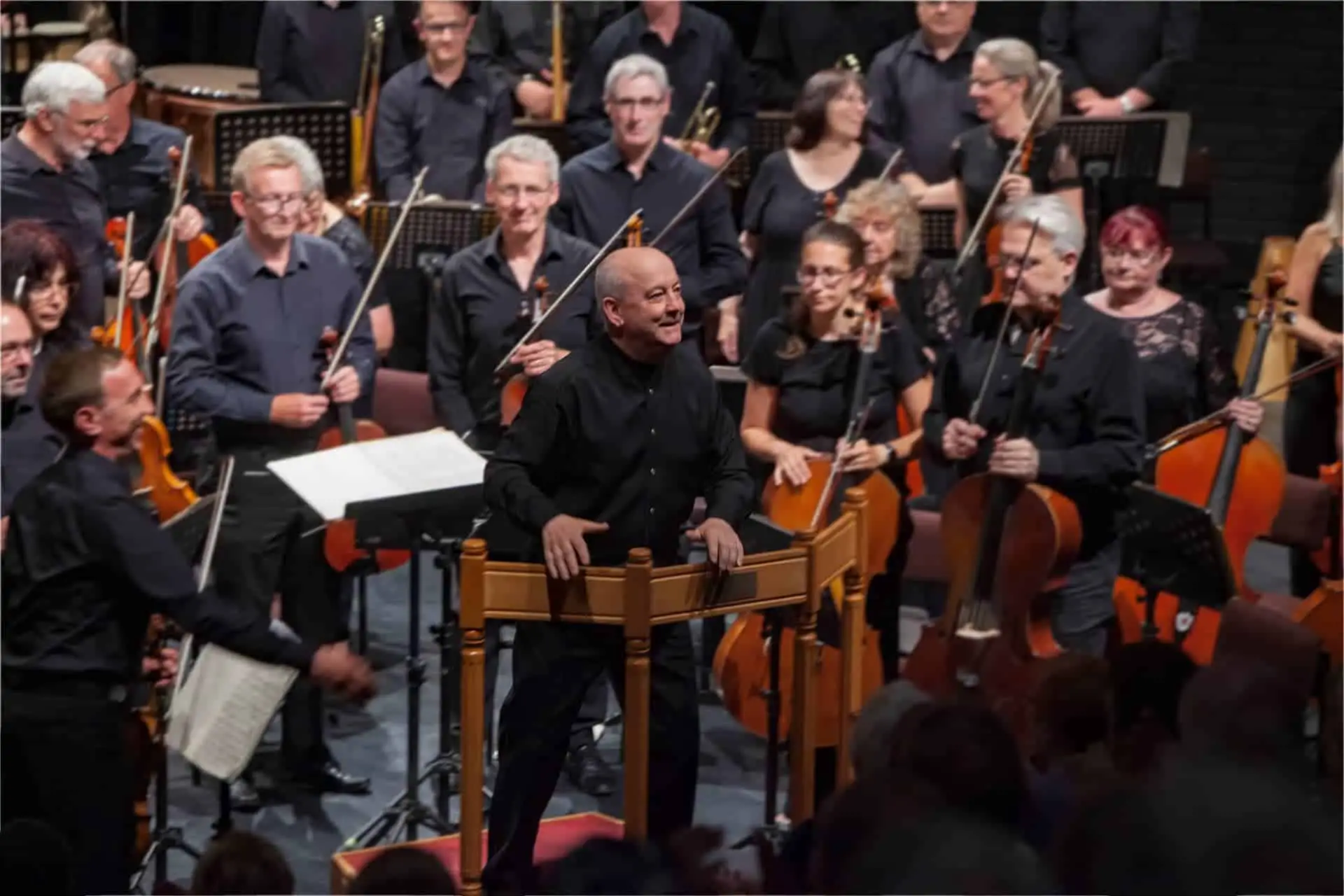Jonathan Dodd shares his review of the latest Isle of Wight Symphony Orchestra (IWSO) concert. Images with kind permission of Allan Marsh. Ed
Last Saturday, 1st July, I attended the final concert of the Isle of Wight Symphony Orchestra’s (IWSO) 2022-2023 season, and I was in a state of excitement, mainly because one of my all-time favourite pieces was to be performed, along with several others, either known and liked, or unknown and waiting to be discovered.
The IWSO always make the last concert special, as a climax to the season, and I knew it was going to be an Event. I was not to be disappointed.
The Bat Disguise, apparently
The auditorium was packed, and the temperature and humidity rose, but this was soon forgotten as the orchestra began their programme with the Overture Die Fledermaus by Johann Strauss II. His father, an established composer in his own right, was totally against his son becoming a performer and composer, and there was a bitter rivalry between them.
Nevertheless, Johann Strauss became immensely popular, particularly with his operettas, of which Die Fledermaus was a great example, combining a story of intrigue and romantic escapades, with a collection of memorable tunes.
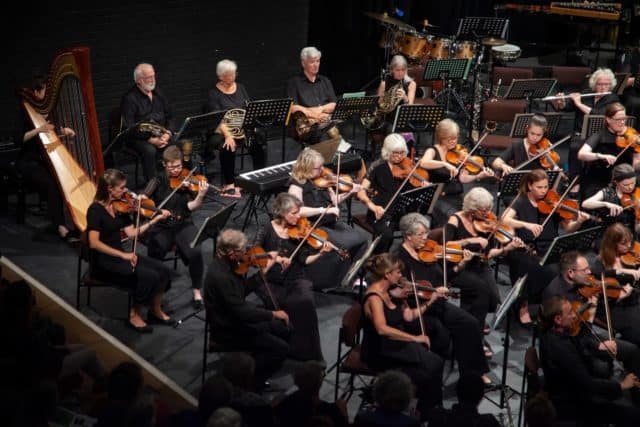
The Overture acts as a taster for the whole piece, highlighting all the well-known lively and flirtatious tunes full of suspense and furious activity and delight in quick succession. The orchestra played it with vigour and pleasure, and it was a brilliant introduction to the evening to come. Exactly what it was written to do. Lovely.
Sheep grazing
Next, the IWSO played the lovely aria Sheep May Safely Graze, written by J S Bach in 1713 as part of a cantata glorifying hunting and praising the beauties of the countryside. It was originally meant to be sung, and then was taken up in the 1930s as part of a ballet suite called The Wise Virgins.
Such is the beauty and innocence of this aria that it was assumed to be religious. Isaac Walton arranged it, and it was this version we heard. I admit to shedding a tear when listening to it, so beautifully was it rendered by the musicians of the IWSO. Thank you, particularly the flute, on the high notes. Perfection.
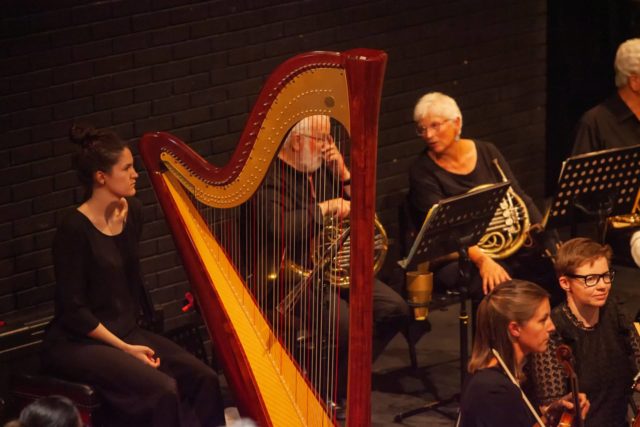
Chamber music 1930s-style
The third piece was the Soirees Musicales, by Benjamin Britten, a series of short pieces inspired by the music of Rossini, who Britten admired, and written in a Twentieth-Century style.
Each piece was crisp and to-the-point, a miniature gem, highlighting many of the orchestra players, who all rose to the occasion and played beautifully.
Rumbles and school romance
What followed can only be described as a triumph. Ever since I was taken to see the film of West Side Story it has become one of my abiding favourites, seeming to me to be so successful in all its facets, story, dance, music, setting and design, and the perfect way these combined together to overwhelm my senses and emotions.
I’ve seen it in all its forms no, and it never ceases to move me. But before last Saturday I had never sat and listened to the Symphonic Dance Suite played before me by a live orchestra. And there I was, once again overwhelmed. I may have shed a tear for Bach’s sheep, but I shed many during this performance.
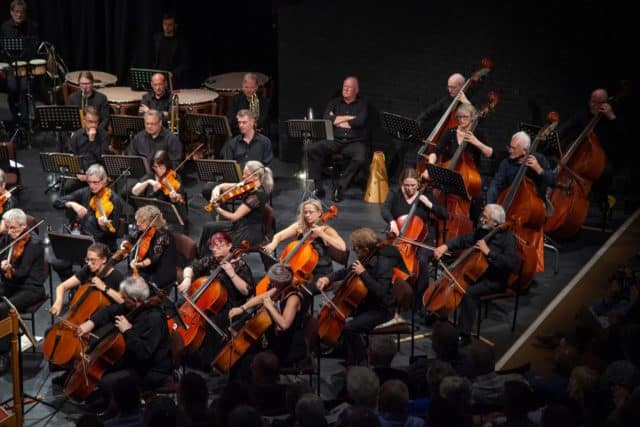
How can I describe the tornado that is Bernstein’s music? It uses the full range of every instrument, combines tunes and styles and rhythms in such a daring way, and it does so at such a pace and sometimes frenetic way that I just wanted to watch each musician and set of musicians play each part, because I could see them all marvelling at how they managed to play it at all, and then at how wonderful it sounded when it was all happening at the same time. And I laughed when everyone started clicking their fingers or calling ‘Mambo!’. And I wept when the romance and tragedy of Tony and Maria were outlined by the haunting tunes that accompanied their brief journey through the suite.
I can’t praise enough the sheer stamina and enthusiasm of every player in the orchestra who literally gave it their all. And Mr Butcher deserves praise too, for keeping them all together in such a way, like the captain in the bridge during a thrilling and violent storm. I still thrill when I think about it days later. This emotion should be bottled. I’d buy a lifetime’s supply. Bravo All!
English Composers- Arnold
After the interval, to which the exhausted musicians staggered with beautiful smiles on all their faces, everyone reconvened for the Little Suite No. 1 by Malcolm Arnold. His own instrument was the trumpet, and the brass instruments feature particularly here.
Each section is very clear and concise, giving full rein to each part of the orchestra to play separately and together, and it was very pleasant and calm and somehow optimistic. The IWSO clearly enjoyed it immensely too. Thank you. I will definitely listen to this again.
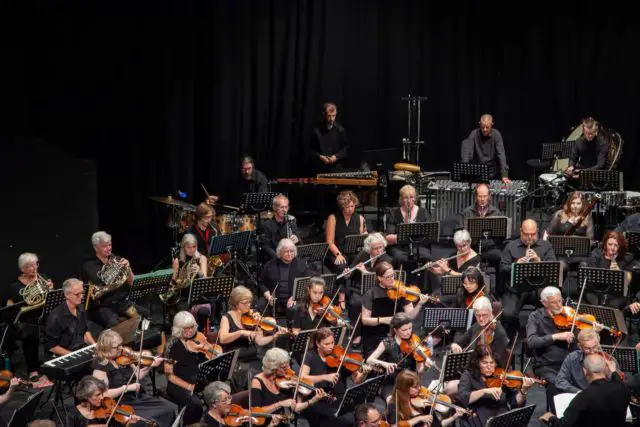
Jonathan Dove
The penultimate piece was A Tribute To The Queen Mother, by Jonathan Dove., written for a BBC film about the late Queen Mother, each part illustrating scenes from her life. It had a musical theme that was immediately recognisable as an allusion to her Scottishness, and it vey gently laid its musical tributes at her feet in a gentle and admiring way.
I had never heard it before, and it struck me as a piece that could be used in other less-specific ways. I hope it doesn’t disappear, although there might be another Queen Mother in some distant future.
Coates, a historical journey
The last piece to end the season was again unknown to me, although I have always enjoyed a bit of Eric Coates. This was the Four Centuries Suite. He wrote it in London during the Blitz in 1941, and it was designed to highlight the last four centuries, beginning with the Seventeenth.
It was very Eric Coates, light and airy and danceable, and I could detect elements of each century in the relevant passages. I particularly liked the Hornpipe in the 17th, and the dance band section in the 20th.
Thanks to all, every musician, everyone in the background, and all those in the front, for working so hard and producing such inspiring music. And thanks to my fellow audience members, whose enthusiasm and sheer determination to get to each concert makes it all complete. Discovering the Isle of Wight Symphony Orchestra was wonderful, and I intend to keep turning up and wondering at the sheer wonderfulness of it all. Bravo!
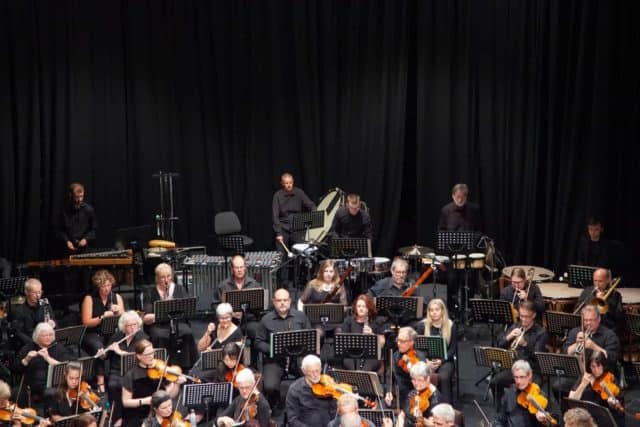
Next Concert
The IWSO will, as usual, be performing at the Steam Railway Station in Havenstreet, starting at 3pm on Saturday 29th July. Take seating and a picnic, there’ll be a bar, and there will be joyful music, and children, and dogs. And train whistles adding to the occasion. Marvellous.
Sadly I won’t be able to attend, and I’m going to miss it. Please go in my place, and have a lot of fun in the sunshine.
Next season
You’ll be glad to know that it all starts again on Sunday 5th November, same time, same place.
There’ll be the beautiful Brigg Fair by Delius, Samuel Barber’s sublime Violin Concerto, a personal favourite, and then the mighty Titan Symphony No. 1, by that musical giant Gustav Mahler. It’ll be awesome.
Get your tickets ASAP, or even better, buy season tickets.
Every little helps, and you’ll always know where your seats are. See you there!

